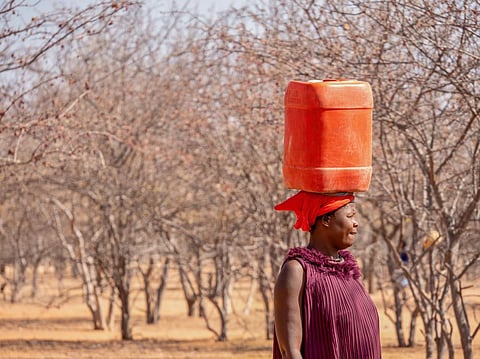

More than half the fragile and conflict-affected states (FCS) that are disproportionately affected by climate change are in Africa, according to a new report by the International Monetary Fund (IMF).
These include Burkina Faso, Cameroon, Central African Republic, Democratic Republic of Congo, Ethiopia, Mali, Mozambique, Niger, Nigeria, Somalia, South Sudan, Sudan, Burundi, Chad, Comoros among others.
Around 39 countries (including a territory — West Bank and Gaza) that are home to nearly one billion people and 43 per cent of the world’s poor are classified as FCS by the World Bank.
These countries have an overreliance on climate-dependent sectors particularly agriculture, populations pushed into flood- and landslide-prone areas and limited access to safe drinking water and sanitation, making them more vulnerable to climate change, the IMF researchers noted.
From the Central African Republic to Somalia and Sudan, FCS suffer more from floods, droughts, storms and other climate-related shocks than other countries, when they have contributed the least to climate change, the paper published August 30, 2023 highlighted.
In FCS, climate vulnerability and underlying fragilities like conflict, heavy dependence on rainfed agriculture and weak capacity and policy buffers — aggravate the issues and intensify the negative impact on people and economies.
Lower food production combined with higher prices can drive 50 million more people in these countries towards hunger by 2060. In a high emissions scenario, conflict deaths as a share of the population for a median FCS will increase by 8.5 per cent by 2060, and up to 14 per cent in countries facing an extreme increase in temperature, according to estimates. Temperatures in fragile states are already higher than in other countries because of their geographical location, the IMF analysts highlighted.
By 2040, fragile states could face 61 days a year of temperatures above 35 degrees Celsius on average — four times more than other countries. Extreme heat, along with the more frequent extreme weather events that come with it, will endanger human health and hurt productivity and jobs in key sectors such as agriculture and construction, said the report.
Each year, three times more people are affected by natural disasters in fragile states than in other countries, according to IMF. “Disasters in fragile states displace more than twice the share of the population in other countries.”
GDP losses due to climate shocks are more severe and persistent in FCS than in other countries, the IMF report showed. In the near term, cumulative GDP losses were estimated at about 4 per cent in FCS after three years of a disruptive extreme weather event, compared to about 1 per cent in other countries, it added.
“Over the longer term, worsening drought conditions were found to have a larger and more persistent impact in FCS than non-FCS, which means that incomes in FCS would fall further and further behind other countries,” the authors noted.
IMF’s 2023 Staff Climate Note Climate Challenges in Fragile and Conflict-Affected States stated:
Worsening drought conditions in FCS would cut real GDP per capita growth every year by 0.2 percentage point in a low emissions scenario and 0.4 percentage point in a high emissions scenario. By 2060, real GDP per capita in FCS would be 5 per cent lower in the high emissions scenario compared to the low emissions scenario.
Case studies mentioned in the IMF paper also showed how different sources of fragility intensified the impact of climate shocks by impairing scarce irrigation infrastructure and destablising agricultural production, in turn affecting food security.
For instance, Mali’s largest irrigation scheme, ‘Office du Niger’, has been underperforming significantly since the security crisis in 2012. Vegetation losses have been linked to increased flooding and a deterioration of the drainage system as farmers fled the area due to security risks.
In Sudan, the Gezira irrigation scheme, one of the largest in Africa, has been performing poorly mainly due to accumulation of sediment and clogging of canals and pipes. As a result, farmland vegetation in the scheme has become sharply correlated to precipitation, not much different to rainfed farms. While in South Sudan, the Aweil irrigation scheme, one of very few irrigated lands in the country, was abandoned in absence of maintenance, which was last undertaken in the 1980s.
Conflict weakens the capacity of fragile states to manage climate risks. In Somalia, for instance, the areas most severely affected by food insecurity and hunger due to the prolonged drought in 2021-2022 were under the control of terrorist groups that thwarted delivery of humanitarian assistance.
A total of 48 African countries have agreed to adopt the Kampala Ministerial Declaration on Migration, Environment and Climate Change (KDMECC) to address the nexus of human mobility and climate change in the continent.
Representatives from the African countries had gathered in Nairobi, Kenya, for the Conference of States on the continental expansion of the Kampala Ministerial Declaration on Migration, Environment, and0 Climate Change that began August 23, 2023.
In this scenario, the Africa Climate Summit 23 being held in Nairobi, Kenya from September 4-6, 2023 is important and is expected to come up with solutions to support these vulnerable countries.
The Africa Climate Summit is the largest gathering of African Heads of State, Ministers, UN agencies, humanitarian and development partners, the private sector and youth in the continent’s history. It represents an important opportunity to address the increasing impacts of climate change on human mobility in Africa, according to International Organization for Migration.